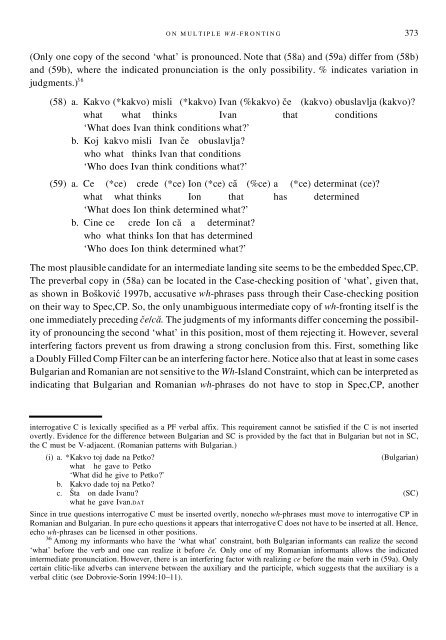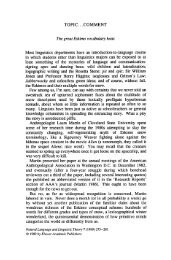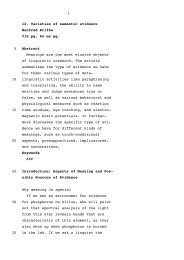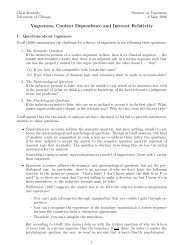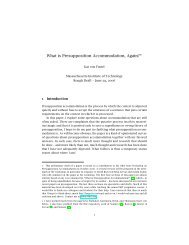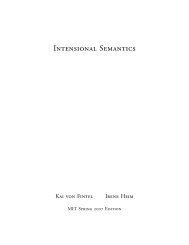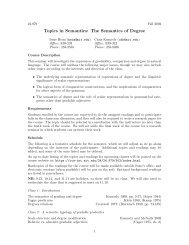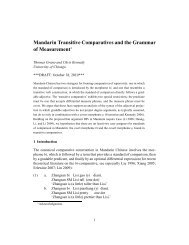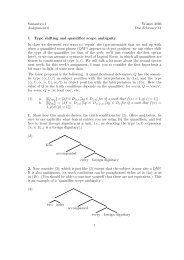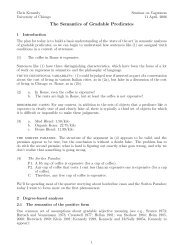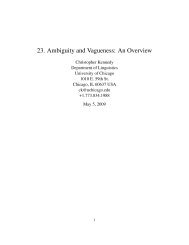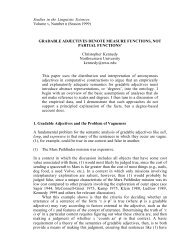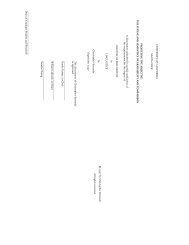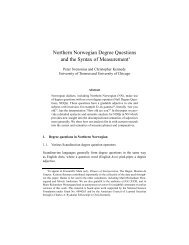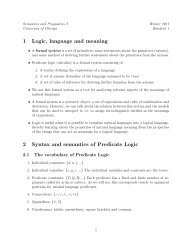372 ZÏ E L J K O B O SÏ K O V I Ć(57) a. Koj i na kogo j e t i pokazal t j kogo?who to whom is shown whomb. Koj i kogo j e t i pokazal na kogo t j ?Finally, the third wh-phrase moves. In (57b) nothing goes wrong if it undergoes phrasal movement,which is then the only option. Since the movement carries phonological features, this wh-phraseis also pronounced in the raised position, giving (40b). However, if the third wh-phrase undergoesphrasal movement in (57a), the constraint against consecutive homophonous wh-phrases is violated.To avoid this, the third wh-phrase undergoes feature movement. This wh-phrase is thenpronounced in its base-generated position, giving (46a). Neither derivation can yield (46b), adesirable result.Let us see if we can tease apart the Move F analysis and the pronounce-a-copy analysis(PCA). Note first that the PCA may be conceptuallymore appealing. The Move F analysis involvessome globality (Move F sometimes takes place instead <strong>of</strong> phrasal movement in the syntax forPF reasons), which is not the case with the PCA. 3 4 Let us, however, see if the analyses can beteased apart empirically.Under the most natural interpretation <strong>of</strong> the PCA we would expect successive-cyclic movementto have a PF reflex in the constructions under consideration. Unless we specifically stipulatethat only the head or the very tail <strong>of</strong> a chain can be pronounced (see Franks 1998 for a differentproposal), it seems that the second sÏta in the SC sÏta sÏta ‘what what’ construction and the echowh-phrase in the Romanian construction would not have to be pronounced in their base positions.This is not the case necessarily under the Move F analysis. In fact, unless additional assumptionsare adopted (for relevant discussion see Cheng 2000, where it is proposed that Move F can belaunched in the middle <strong>of</strong> successive-cyclic phrasal movement), under this analysis we wouldexpect the relevant wh-phrases to occur in the position they occupy prior to wh-movement. Thetest in question cannot be carried out for the SC ‘what what’ construction because <strong>of</strong> an interferingfactor. As shown in BosÏ ković 1997a, SC has more than one position for focus licensing <strong>of</strong> whphrases,as a result <strong>of</strong> which it is difficult to determine in more complicated constructions whetherwe are dealing with pronunciation <strong>of</strong> a copy <strong>of</strong> the second ‘what’, or with the head <strong>of</strong> the focusmovement chain <strong>of</strong> the second ‘what’. The same problem arises with Romanian echo wh-constructionssince Romanian seems to have more than one position where moving echo wh-phrasescan be licensed. The problem, however, does not arise in Bulgarian and Romanian ‘what what’constructions since, as Rudin (1988) shows (see also (29)–(30)), in these languages only interrogativeC can license non-wh-fronting <strong>of</strong> nonecho wh-phrases. 3 5 Unfortunately, the data are not clear.34 Similar globality is quite generally present in Chomsky’s (1995) view <strong>of</strong> Move F, where phrasal movement alwaystakes place in overt syntax for PF reasons, as well as in Chomsky’s (1995:chap. 3) view <strong>of</strong> strength as an illegitimatePF object.35 This does not hold for echo wh-phrases. This does not provide evidence that non-wh-fronting <strong>of</strong> nonecho whphrasesand non-wh-fronting <strong>of</strong> echo wh-phrases in these languages are different phenomena. It is possible that althoughthere is more than one potential licenser for non-wh-fronting in these languages, interrogative C must be the licenserwhenever it is present (see BosÏ ković 2002 for explanation <strong>of</strong> why this is the case). In BosÏ ković 2001 I suggest that,unlike in SC, in Bulgarian interrogative C is always inserted overtly. The reason for this is that, unlike in SC, in Bulgarian
O N M U L T I P L E W H - F R O N T I N G 373(<strong>On</strong>ly one copy <strong>of</strong> the second ‘what’ is pronounced. Note that (58a) and (59a) differ from (58b)and (59b), where the indicated pronunciation is the only possibility. % indicates variation injudgments.) 3 6(58) a. Kakvo (*kakvo) misli (*kakvo) Ivan (%kakvo) cÏ e (kakvo) obuslavlja (kakvo)?what what thinks Ivan that conditions‘<strong>Wh</strong>at does Ivan think conditions what?’b. Koj kakvo misli Ivan cÏ e obuslavlja?who what thinks Ivan that conditions‘<strong>Wh</strong>o does Ivan think conditions what?’(59) a. Ce (*ce) crede (*ce) Ion (*ce) caÆ (%ce) a (*ce) determinat (ce)?what what thinks Ion that has determined‘<strong>Wh</strong>at does Ion think determined what?’b. Cine ce crede Ion caÆ a determinat?who what thinks Ion that has determined‘<strong>Wh</strong>o does Ion think determined what?’The most plausible candidate for an intermediate landing site seems to be the embedded Spec,CP.The preverbal copy in (58a) can be located in the Case-checking position <strong>of</strong> ‘what’, given that,as shown in BosÏ ković 1997b, accusative wh-phrases pass through their Case-checking positionon their way to Spec,CP. So, the only unambiguous intermediate copy <strong>of</strong> wh-fronting itself is theone immediately preceding cÏe/caÆ. The judgments <strong>of</strong> my informants differ concerning the possibility<strong>of</strong> pronouncing the second ‘what’ in this position, most <strong>of</strong> them rejecting it. However, severalinterfering factors prevent us from drawing a strong conclusion from this. First, something likea Doubly Filled Comp Filter can be an interfering factor here. Notice also that at least in some casesBulgarian and Romanian are not sensitive to the <strong>Wh</strong>-Island Constraint, which can be interpreted asindicating that Bulgarian and Romanian wh-phrases do not have to stop in Spec,CP, anotherinterrogative C is lexically specified as a PF verbal affix. This requirement cannot be satisfied if the C is not insertedovertly. Evidence for the difference between Bulgarian and SC is provided by the fact that in Bulgarian but not in SC,the C must be V-adjacent. (Romanian patterns with Bulgarian.)(i) a. *Kakvo toj dade na Petko?(Bulgarian)what he gave to Petko‘<strong>Wh</strong>at did he give to Petko?’b. Kakvo dade toj na Petko?c. SÏ ta on dade Ivanu?(SC)what he gave Ivan.DATSince in true questions interrogative C must be inserted overtly, nonecho wh-phrases must move to interrogative CP inRomanian and Bulgarian. In pure echo questions it appears that interrogative C does not have to be inserted at all. Hence,echo wh-phrases can be licensed in other positions.36 Among my informants who have the ‘what what’ constraint, both Bulgarian informants can realize the second‘what’ before the verb and one can realize it before cÏe. <strong>On</strong>ly one <strong>of</strong> my Romanian informants allows the indicatedintermediate pronunciation. However, there is an interfering factor with realizing ce before the main verb in (59a). <strong>On</strong>lycertain clitic-like adverbs can intervene between the auxiliary and the participle, which suggests that the auxiliary is averbal clitic (see Dobrovie-Sorin 1994:10–11).


